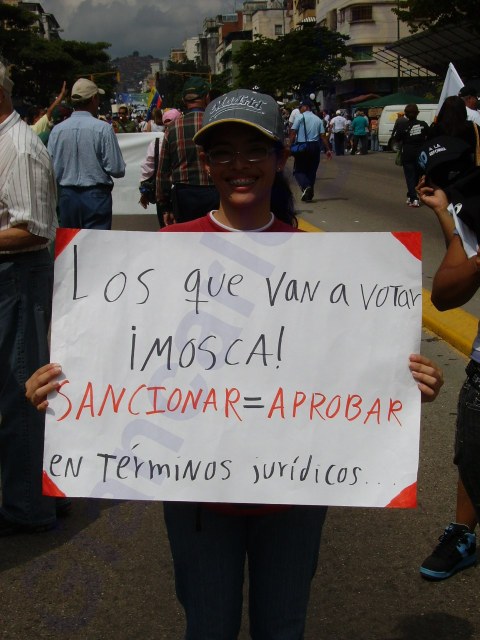Protests Continue in Venezuela against a Nightmarish Regime By Jerry Brewer
The broken silence in Venezuela is deafening as the once proud and strong nation is facing mass protest demonstrations, many of which have turned deadly over the past three weeks. And the violent situations are exacerbated with the threat of anti-government protesters clashing with pro-government groups and/or security forces.Thousands of citizens have taken to the streets in cities throughout Venezuela, to stand boldly as military, police, rogue security officials and violent civilian pro-government enforcers moved in with aggressive maneuvers and weaponry. Much of the nation’s message is that they will no longer be silent after 15 years of repression and corrupt iron-fisted rule.
The official death toll is inaccurate -- actually it is unknown, this due to the massive government crackdown on media coverage. Hundreds have been injured, hundreds more detained, many are missing, a number of the dead have been killed by tactical-style shots to the head by snipers. As well, pictures coming out of Venezuela taken by citizens and disseminated worldwide via the Internet show what appear to be military and police firing randomly, as well as up at apartment buildings and their balconies. Graphic pictures of beaten victims and bloody corpses have strewn the Internet.
And while President Nicolas Maduro should be urging restraint and tolerance, especially of his government enforcers, while allowing freedom of expression and calling for peaceful demonstrations, with a straight face (as the late Hugo Chavez frequently did before him) he is instead accusing the United States of organizing this movement against the nation, and he claims the goal is a coup d'état.
Referring to protesters in the region of Tachira last week, Maduro said, “If I have to declare a state of exception, I’m ready to declare it and send in the tanks, the troops, planes, all of the military force of the country.” He also threatened to jail other opposition politicians and protest leaders – and he has done just that.
Much like his predecessor and idol, Hugo Chavez, Maduro rejects any action or words that are not consistent with tight presidential rule and mandates. Voices of the people in opposition are not welcome, they must not be tolerated, and they must be repressed from world scrutiny as if the citizens are puppets, robots, or perceived stupid by nature.
Opposition legislators have been barred from debates and stripped of committee posts in the National Assembly. And when an opposition leader called for a protest last week, “Mr. Maduro scheduled his own march to start at the same spot and dispatched the National Guard to try to block protesters from rallying elsewhere.”
Veracity was never the strong suit of the buffoonish-style of diplomacy of Hugo Chavez or his choice of successor, Nicolas Maduro. Truth had no place in Chavez’s Bolivarian Revolution as he misled an entire country, a revolution nurtured by and through Fidel Castro’s original failed Cuban revolution -- both, bringing death and misery to the people of Cuba and Venezuela over long periods of dictatorial rule. This while the Castro brothers and Chavez became wealthy and managed to hold on to power.
What was the record of Hugo Chavez’s rule; what did his legacy leave; and what has Maduro done to perpetuate the Chavez/Castro ideology? It appears they are still on the same page this very day. The problem is that Maduro struggles to understand fact from fiction, while trudging on into an ever sinking pit of common personal and professional destruction which threatens to bring the nation down with him.
The disastrous record left by Chavez shows massively squandered oil wealth, depleted with practically no record of accountability. Chavez’s sudden personal wealth -- now enjoyed by his heirs, is graphically archived in page after page on the Internet as “La fortuna de Hugo Chavez.” And one of Chavez’s most ironic and memorable quotes is also pasted on Internet pages of the world's media: “Ser rico es malo" (to be rich is bad).
Although it did not start under Maduro’s continuation of Chavez doctrine, Venezuelans today are plagued by empty food market shelves. Staples such as milk, sugar, flour, eggs, and other grocery items are rare. As well, the nation is suffering from a decaying infrastructure, thousands of people are living in squalor, there are rolling blackouts of electricity, and related inconveniences.Being kept silenced, threatened, and imprisoned for speaking out was the last straw for the thousands and thousands who have taken to the streets to voice their outrage, with many willing to die for their beliefs. One of the cries heard throughout the now bloody demonstrations: “… days of protests for 15 years of silence.” To which, unfortunately, the roguish Maduro regime has replied with relentless retaliation.
Silencing the media in Venezuela, and controlling what is seen and heard, began with Chavez and rapidly accelerated under Maduro. The only television station to regularly broadcast voices critical of the government was sold last year.
Last week Maduro banned a foreign cable news channel after it showed images of a young protester shot to death. Subsequently he revoked the credentials of a CNN news team and sent them packing.
As President Maduro voices strength and adherence to the socialist revolution, he ignores the truths and realities of his failures and blames the US for interference.
So, how does he ignore the hundreds of thousands throughout Venezuela that are demanding to be heard and willing to tell him to his face where the blame lies? It appears that Maduro does not want to hear any of this, and most importantly -- he does not want the world media to report his own people echoing it.
Jerry Brewer is C.E.O. of Criminal Justice International Associates, a global threat mitigation firm headquartered in northern Virginia.
Labels: #TheExit, 2014, Chavez, Jerry Brewer, Maduro, Nightmarish Regime, Protest, Tachira, USA, Venezuela














